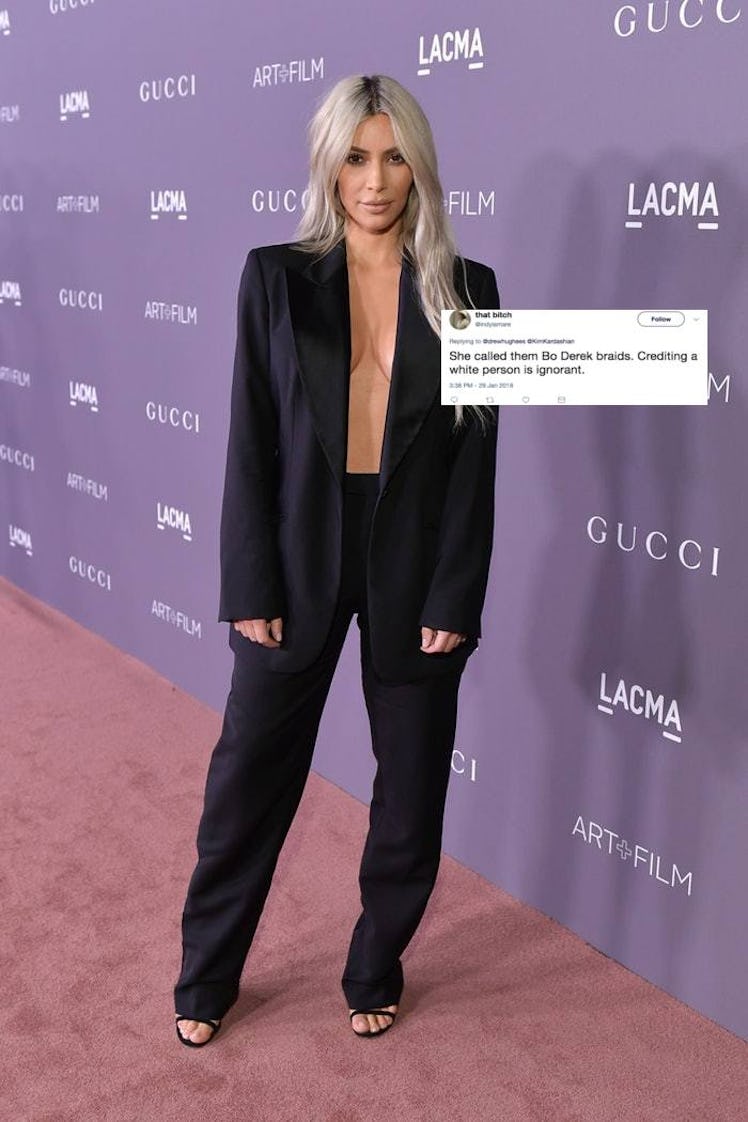
Kim Kardashian’s "Bo West" Braids Are Actually Called Cornrows & Twitter Is Upset
Another day, another Kardashian breaking the internet. After posting a revealing pic on her social media accounts, Kim Kardashian's "Bo West" braids controversy is totally infuriating Twitter. I normally don't get into Twitter beef, but this time people have a right to be upset. They're called cornrows Kim, not "Bo West" braids, as you have classified them. Sometimes, giving credit where credit is due makes all the difference.
Recently Kardashian took to Snapchat to show off a braided hairstyle called cornrows. She personally chose to don hers with beads at the end, which is a pretty traditional look. What set Twitter off though wasn't the actual braids in question. Although some were annoyed that another Kardashian appropriated a culture that wasn't theirs to begin with, it was Kim's misjudgment in crediting the person behind this look.
On Snap, Kardashian stated "So guys, I did Bo Derek braids and I'm really into it." Full stop and freeze! Not only did Kardashian boldly show off the braided look, but she had the audacity to credit them to Bo Derek. If you're unfamiliar with Bo Derek, she's a model who appeared in the 1979 movie 10. In the film, Derek sported long, blonde cornrows, and in doing so, became inextricably associated with the style in pop culture — even though women of color had been wearing them for ages.
This isn't the first time a Kardashian/Jenner has gotten heat for their braids, nor the first time Derek has been brought into the conversation. Interestingly enough, when Kylie Jenner was bombarded with backlash on her braids in 2015, Derek actually talked about cornrows at a FX tv show premiere, saying she thought the backlash was "stupid," and that it was just a hairdo.
No disrespect to Bo Derek, but I was a tad confused at how Kardashian could attribute such an iconic style (known as Fulani braids, which Allure notes can be traced decades back to the Fulani ethnic group in West Africa and to the women of the Wodaabe tribe) worn by African and African-American women for generations to a white model/actress who pretty much wore them once. When I originally saw the photo I wasn't upset at all, in fact I think Kardashian looks cute. But by labeling the look something it isn't, she made the situation that much worse.
Do I think Kardashian purposely or vindictively meant to put up the post? No, I don't. What's annoying, though, is the constant lack of judgment when it comes to moments like these. Unlike what Derek believes, pointing out moments like these isn't "stupid." In an ideal world, they're teaching moments, wherein people receptively listen and acknowledge their mistakes.
In Kardashian's case though, her family has been on the receiving end of multiple cultural appropriation conversations, so she should really know better by now. It's exhausting, like that friend who keeps going back to her gross ex-boyfriend, and you're like dude, how many times does he have to mess up before you wake up? When will cultural appropriation click for Kardashian, who I fully believe doesn't intend any harm?
Moments after she updated the problematic caption, Twitter users began to call Kardashian West out.
"It looks like she's referencing Bo Derek. But Bo having these braids back in the day was also appropriation," wrote one user, bringing up an important point. I totally get that Kardashian was probably referencing Derek, but even Derek had a black stylist on set that braided her hair that day. Surprisingly, another thing that annoys me in moments like these are reactions that slam the style. I think it's counterproductive to make comments that the braids don't look good. I mean that braiding pattern is immaculate.
Others write "well it's really not that big of a deal" or "there's so much more going on besides this...," attempting to underscore the harm. While there are certainly many other things going on in society, I totally disagree with the first half. When you have young black girls punished over their hairstyles, or black women receiving prejudice in the workplace for their hairstyles, don't say it's irrelevant and worth glossing over a moment like this.
Overall, it causes a dichotomy where young black girls, and even older black women, view themselves as the "other" and reflect on being shamed for a style that spans generations. And in their cases, those women don't get to backtrack with a perfectly constructed PR statement.